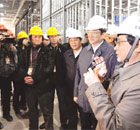-
-
China Daily E-paper
Op-Ed Contributors
Transparent budget, happy people
By Ma Chao (China Daily)
Updated: 2010-04-29 07:55
 |
Large Medium Small |
Editor's note: Wenling and Baimiao have set good examples in budget transparency, which seems to be a win-win situation for the people and the government. But it is uncertain whether their good practices will be extended to other places.
Last month, Baimiao in Sichuan province became "China's first transparent township government". People hailed it for making public details of its administrative expenditure, including the purchase of a writing pad for 1.5 yuan. The once unknown township has hogged the media limelight ever since it posted its budget online, prompting us to pay more attention to budget transparency, a goal advocated by the central government and academics.
A few experts played crucial roles behind Baimiao's courageous experiment, and Li Fan, a political expert with the World and China Institute, is one of them. Working for China's budget reform for years, Li is not only an academic exploring and writing on the subject, but also a practitioner engaged in several budget-transparency experiments at the grassroots level.
|
||||
After Wenling, several local governments have implemented the budget reform. Shanghai's Minhang district and Huinan township, and Zhejiang's Ninghai county are three of them. All these places, however, are in the country's eastern coastal area, prompting Li to say: "Without an example in the central and western China, budget-transparency reform cannot be convincing enough. People may doubt whether it could be implemented in the entire country." That's precisely why he made it a mission in 2006 to carry the budget reform to the country's central and western areas. The experience was not encouraging because many township leaders declined his suggestions
He summarizes the reasons for their refusal or reluctance thus: First, most of the towns in central and western China are relatively poor and thus reluctant to make their budgets public. Second, since funds from the central government and other higher authorities comprise a major part of many towns' budgets they have little say in deciding the heads of expenditure. Third, counties usually take charge of townships' budgets, leaving little room for lower-tier governments to formulate their expenditure chart.
Despite all this, Li did not lose hope. Finally, with the help of Peng Dapeng, an expert on rural affairs with the Sichuan Party school, Li met Zhang Yingshang, Party secretary of Baimiao township, who had the guts to implement budget reform. But by focusing only on the transparency angle of Baimiao's budget, news reports have neglected another important aspect: people's participation. To be honest, before making the budget public, the Baimiao government convened a meeting to discuss the budget which was attended by more than 70 representatives of the local people. They told the meeting what the township's residents needed urgently and how the budget funds should be spent. Their views were summarized and forwarded to the higher authorities.
People's participation in the making of a government budget is essential, says Li. A public budget should reflect and address the interests of all social strata of society. All social groups should have a say in the preparation of budget to make it fair and balanced. Transparency and participation are two sides of a coin. In the absence of people's genuine participation, budget transparency alone cannot make a big difference.












